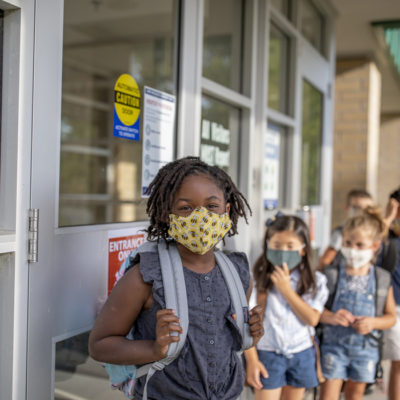This resource is provided by ACSA Partner4Purpose AALRR.
The California Department of Public Health (“CDPH”) issued an order (the “Order”) on August 11, 2021, to take effect August 12, 2021, which requires public and private K-12 employers (“K-12 School Employers”) to verify the COVID-19 vaccination status of all workers, including employees and unpaid volunteers, and requires workers who do not provide proof of full vaccination submit to weekly COVID-19 testing. (See CDPH Order and Governor’s Announcement.)
This Order applies to all paid and unpaid adults serving in the school setting in public and private schools from transitional kindergarten through grade 12. This includes all certificated and classified staff (and analogous staff working in private school settings), as well as volunteers who are on-site at a school campus supporting school functions (“K-12 Workers”).
Under the Order, K-12 School Employers are specifically required to do the following:
1. Verify Vaccine Status of All K-12 Workers
K-12 School Employers must verify vaccination status of all K-12 Workers by requiring K-12 Workers to submit any of the following documentation:
COVID-19 Vaccination Record Card issued by the CDC or WHO Yellow Card (including photocopy, photograph, or screenshot on an electronic device);
Documentation of COVID-19 vaccination from a health care provider;
Digital vaccine record that includes a QR code readable by a SMART Health Card reader and which displays name, birth date, vaccine date, and vaccine type; or
Documentation of COVID-19 vaccination from “other contracted employers who follow these vaccination records guidelines and standards.”
K-12 School Employers are required to have a plan in place to track K-12 Workers’ vaccination status. If a K-12 Worker declines to disclose their vaccination status or declines to provide documentation, the K-12 Worker must be considered unvaccinated (and will be subject to weekly testing).
2. Require School Employees to Be Vaccinated or Submit To Weekly Testing
Effective August 12, 2021, K-12 School Employers must require all K-12 Workers who are not fully vaccinated (i.e., two weeks after the final vaccination dose), including those who are partially vaccinated or whose vaccination status is unknown or who have previously recovered from COVID-19 infection, to submit to at least once weekly PCR testing or antigen testing. Fully vaccinated K-12 Workers are not subject to this requirement.
The test method “must have either an Emergency Authorization from the US Food and Drug Administration or be operating per the Laboratory Developed Test requirements by the U.S. Centers for Medicare and Medicaid Services.”
K-12 School Employers should track test results, conduct workplace contact tracing, and must report results to local public health departments. K-12 School Employers are required to provide K-12 Workers’ vaccination records, when requested by public health officials, for purposes of case investigation.
3. Fully Comply With the CDPH Order By October 15, 2021
The Order indicates that “facilities must be in full compliance with the Order by October 15, 2021.” This suggests that while the Order is effective August 12, 2021, K-12 School Employers who are unable to immediately achieve full compliance have a grace period, until October 15, 2021, to achieve full compliance. K-12 School Employers are advised, however, to implement the Order as soon as reasonably possible, and to document any circumstances which prevent full compliance prior to October 15, 2021.
4. Other Implications
We do not read this directive as barring K-12 School Employers from instituting stricter local requirements for employees (e.g., mandating vaccination and/or requiring more frequent testing of employees, including fully vaccinated employees), but the Order supersedes any conflicting CDPH orders, directives, or guidance, including less restrictive measures. In other words, we read the CDPH directive as setting a floor, not a ceiling, with respect to vaccination and/or testing of school employees.
The Order is mandatory, contains an immutable deadline, and is not negotiable. However, the manner in which the District implements the Order may be subject to effects negotiations, in the same manner as a vaccination/testing policy adopted by a K-12 School Employer. In this regard, please refer to our alert addressing a recent PERB decision holding that an employer was not required to bargain the decision to implement an influenza vaccination requirement for employees; however, the employer was required to negotiate effects.
K-12 School Employers may use funds received from various sources to address costs associated with K-12 Workers’ vaccination verification and weekly testing of unvaccinated K-12 Workers, including Elementary and Secondary School Emergency Relief Fund (ESSER) I, II, and III; Governor’s Emergency Education Relief Fund (GEER) I and II; and In-Person Instruction Grants (AB 86).
CDPH’s current masking guidance, including the requirement of universal masking indoors in K-12 schools (subject to limited exemptions), remains in effect, regardless of a K-12 Worker’s vaccination or testing status.
It should also be noted that among other risks, failure to comply with CDPH orders may jeopardize K-12 School Employers’ insurance coverage, as determined by their carrier, such as coverage for claims arising from failure to adhere to CDPH mask mandate or this vaccine and testing mandate.
Finally, the Order states that it does not apply to child care, higher education, or home school. For community college employers in particular, the State Chancellor’s Office has stated in its Legal Advisory 2021-01 (May 7, 2021)that, in the view of that office, the responsibility for determining whether to impose a vaccination requirement is within the authority of individual community college districts. For community college employers considering adoption of a vaccination requirement for employees, the CDPH Order may, however, serve as a useful model. For these employers, the recent PERB decision referenced above provides important markers as to what is, or is not, subject to bargaining, in the context of employee vaccination/testing requirements.
This AALRR publication is intended for informational purposes only and should not be relied upon in reaching a conclusion in a particular area of law. Applicability of the legal principles discussed may differ substantially in individual situations. Receipt of this or any other AALRR publication does not create an attorney-client relationship. The Firm is not responsible for inadvertent errors that may occur in the publishing process.
© 2021 Atkinson, Andelson, Loya, Ruud & Romo









Leave a Comment